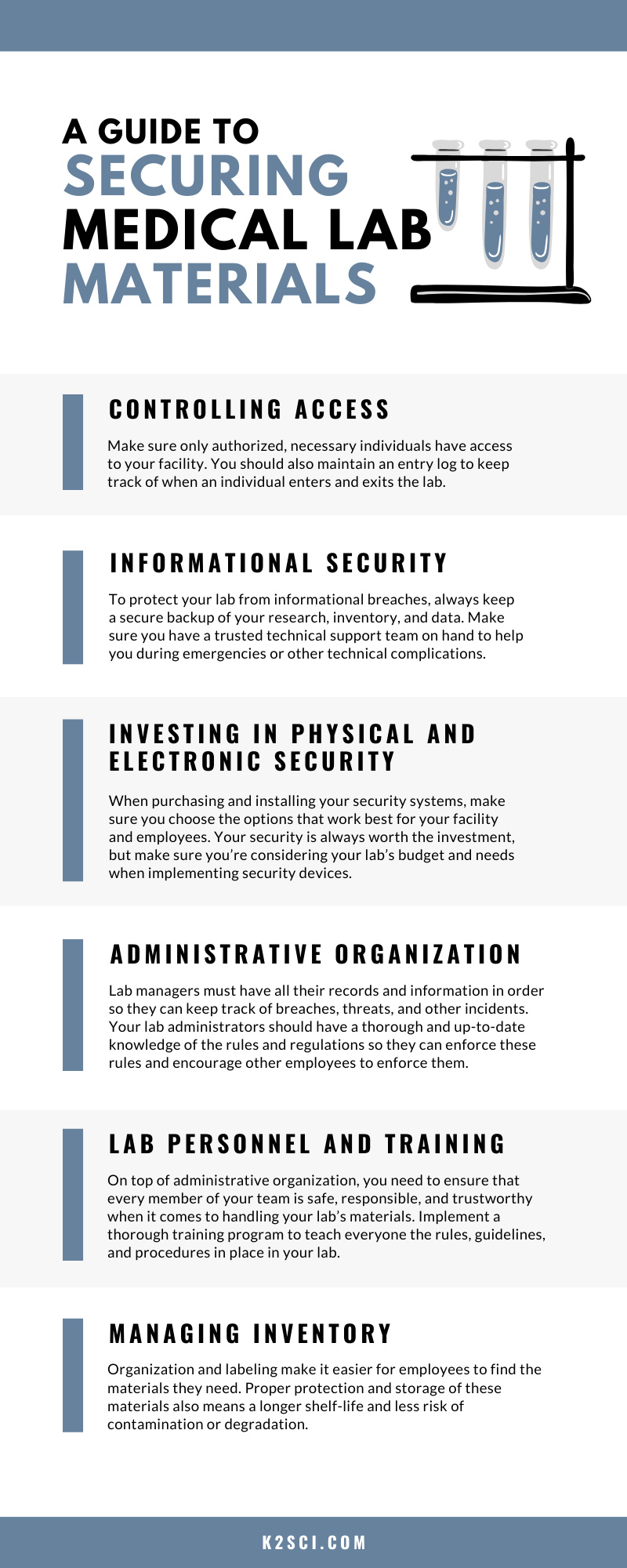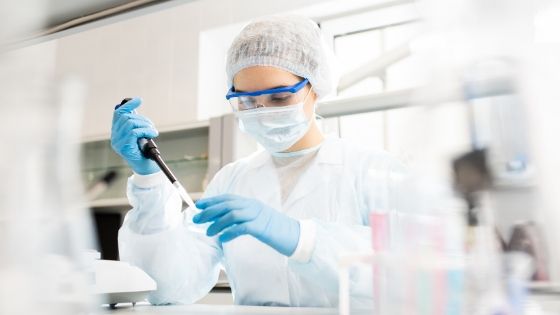Like any business, medical laboratories require safety and security measures to protect their assets and improve their efficiency and productivity. However, the specialized research, equipment, and products in a lab might make security look a little different from many other businesses—especially when it comes to lab components, samples, and products. From hazardous chemicals to valuable vaccines, medical labs are home to many important and expensive materials. To keep these materials safe, organized, and intact, there are a few measures lab managers and personnel must take. On top or ordinary security measures like locks and cameras, you should pay attention to who has access to the lab, how you organize inventory, employee training processes, and more. To help you run a smooth, productive lab and eliminate security threats, here’s our guide to securing lab materials.
Controlling Access
The first step of protecting your medical laboratory’s materials is knowing who has access to your facility as well as when they come in and out. The less people who come into contact with your lab, equipment, and materials, the less risk you face of misuse, damage, or theft. Make sure only authorized, necessary individuals have access to your facility. Create and enforce the use of identification badges. You should also maintain an entry log to keep track of when an individual enters and exits the lab. Be particularly careful when giving access to individuals outside of normal lab hours. Only trusted individuals should have off-hours access to the lab. They should also diligently record their time of entry and exit, as well as anything they used while in the facility. Additionally, if you loan out materials or equipment, create a separate log to track these rentals and be sure to inspect them for damage upon return.
Informational Security
Part of securing medical lab materials is securing your data and information. Laboratories rely on secure data to store inventory lists, research, and other vital information. Viruses and other informational breaches can wreak havoc on the knowledge your facility has gained over time. It also makes material storage, organization, and research much harder to manage. To protect your lab from these informational breaches, always keep a secure backup of your research, inventory, and data. Make sure you have a trusted technical support team on hand to help you during emergencies or other technical complications. Additionally, much like the rest of your facility, it’s important to limit who has access to your information. Use password protection and make sure those with access don’t share their passwords or profiles with others.
Investing in Physical and Electronic Security
Of course, no guide to securing lab materials would be complete without a rundown of the basic surveillance and alarm systems that keep your assets safe. There are a few key tools you can install to improve your facility’s security, including locks, cameras, alarm systems, and access cards. Every lab has different needs and resources. When purchasing and installing your security systems, make sure you choose the options that work best for your facility and employees. For example, a biometric lock provides a high level of security, but it requires more maintenance than a number pad or access card lock. Your security is always worth the investment, but make sure you’re considering your lab’s budget and needs when implementing security devices.
Administrative Organization
Good security relies on good organization. Lab managers must have all their records and information in order so they can keep track of breaches, threats, and other incidents. As mentioned above, part of this is keeping logs of the people and materials that move in and out of your facility. Lab managers are also in charge of correctly and swiftly reporting any incidents that occur so you can minimize further damage. Additionally, your lab administrators should have a thorough and up-to-date knowledge of the rules and regulations so they can enforce these rules and encourage other employees to enforce them.
Lab Personnel and Training
Your security is only as good as the people in charge of it. On top of administrative organization, you need to ensure that every member of your team is safe, responsible, and trustworthy when it comes to handling your lab’s materials. Implement a thorough training program to teach everyone the rules, guidelines, and procedures in place in your lab. You should also provide ongoing training such as workshops and refresher courses so your team can continue to perform at their best. However, it’s important to make sure you’re hiring the right people even before you start training employees. Make background screenings, drug tests, and other checks an essential part of your hiring process. This will help you make smart decisions about who you bring into your lab.
Managing Inventory
A thorough and organized inventory is an essential part of much of your laboratory’s daily work. Many regular lab processes become much easier once you have a reliable inventory management system. Organization and labeling make it easier for employees to find the materials they need. Proper protection and storage of these materials also means a longer shelf-life and less risk of contamination or degradation. It’s particularly important for your team to follow best practices when storing and organizing hazardous materials. Keep incompatible chemicals away from each other. Regularly inspect containers for signs of corrosion or other damage. These practices will help you quickly address and eliminate issues and protect your remaining materials.
Perhaps most importantly, an up-to-date inventory log helps you identify security breaches as quickly as possible. If you keep a record of all the lab’s materials—including where you store these materials, how much you have, and when they were last used—you will quickly notice when something is damaged or missing. Additionally, a reliable inventory system helps you keep track of any expired materials and remove them before they cause further issues and damage to your other materials.
Part of managing your inventory is creating safe, organized, and secure storage solutions. When it comes to your temperature-sensitive lab materials, you need reliable cold storage units. K2 Scientific designs quality lab freezers and refrigerators to keep your samples, components, and products secure at all times. Accurate temperature readings, power failure alarms, and other systems alerting you to temperature fluctuations make these units a reliable source of protection and security for your lab materials.

